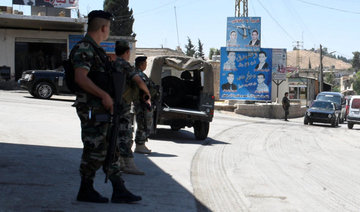BEIRUT: There are just over 174,000 Palestinian refugees in Lebanon, the first census of Palestinians in the country has revealed.
The count was carried out by the government’s Lebanese-Palestinian Dialogue Committee in 12 refugee camps and about 150 informal Palestinian communities.
The census figure of 174,422 is lower than many in Lebanon had believed.
“Some people talked about 400,000, 500,000 or 600,000, and these would be used in politics,” Prime Minister Saad Hariri said on Thursday at the announcement of the census result in Beirut. “The record has been set straight now. Our responsibilities toward our Palestinian brothers living in our land should not be subject to tension, and should not become a point of dispute, either among the Lebanese themselves or between the Lebanese and the Palestinians.
“Lebanon has never renounced its responsibilities, and this should be as clear as the sun. There should be no confusion. No window should be opened for resettlement or any other measures which may contradict the right of return or strip them of their identity, the identity of Palestine.”
The census result is also much lower than the 469,331 people registered in Lebanon with the UN’s Palestinian refugee agency.
“UNRWA does not have a headcount of Palestinian refugees in Lebanon. What we have are official registration records for the number of registered Palestine refugees in Lebanon,” spokeswoman Huda Samra said.
“If someone registered with UNRWA in Lebanon decided to live outside Lebanon, they don’t notify us.”
The census found the population split evenly between men and women, and nearly half are 24 or younger. About 7.2 percent are illiterate, but 93.6 percent of children aged between 3 to 13 are enrolled in schools. About 18 percent of the workforce is unemployed.
The census also found that many occupants of the refugee camps were not Palestinian. About half of those in some camps were Syrians displaced by the war, and people of other nationalities also lived there because rents were low.
Hussein Muneimneh, head of the Lebanese-Palestinian Dialogue Committee, told Arab News the census provided “some of the most important indications that will guide the path of Lebanese-Palestinian relations in the future, and showed the possibility of transcending many taboos that have prevailed in the country for a long time.”
Ola Awad, head of the Palestinian Central Bureau of Statistics, who came from Ramallah for the launch of the census results, said they were “a real chance to change the life conditions of Palestinian refugees in Lebanon on all levels, and show the international community the real picture of their suffering and the effects of the Israeli occupation on our Palestinian people everywhere.”
Fathi Abu Al-Ardat, a Palestine Liberation Organization official in Lebanon, told Arab News: “The number may rise to 200,000, but the numbers are not important. Rather, refugees in Lebanon should live in dignity and with equal opportunities for employment.”














